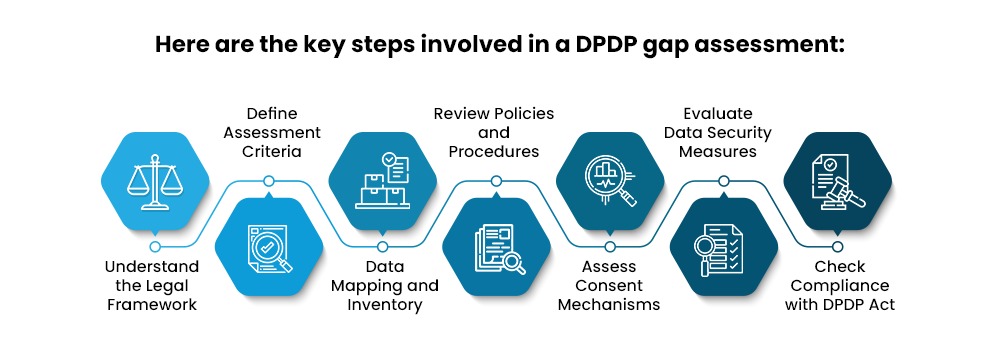
Managing Director, Netrika Consulting India Pvt Ltd, ASIS APAC Board Member
CFE, CII, FCIISCM, CATS, CCPS, CFAP

Managing Director, Netrika Consulting India Pvt Ltd, ASIS APAC Board Member
CFE, CII, FCIISCM, CATS, CCPS, CFAP

Director - Cyber Security
The DPDP is an act of parliament of India that regulates the use of digital personal data. Under the Act, processing is legal, with consent being evident, and guarantee of personal rights to individuals. It is applicable for digital processing of personal data in India and also those relating to provision of products or services to Indian data subjects regardless of location.
DPDP sets forth duties owed by data fiduciaries, data consent management procedures, and valid forms of utilizing personal data in an attempt to strike a delicate balance between the privacy needs of individuals and lawfulness within the modern data-driven world.
Processing of digital personal data in India is governed by the Digital Personal Data Protection Act, 2023, including online and offline acquisition and is inclusive of any data processing activities that occur within or outside of India related to products or services provided in the nation. The provisions under this Act are:
• It requires explicit informed consent on data processing
• Gives information, correction and remedial powers to data principals
• Places extra obligations upon Significant Data Fiduciaries (SDFs).
• Allows for unregulated international data transfers.
• A Data Protection Board is created to resolve disputes.
• Voluntary undertaking and alternative dispute resolution.
The Act clearly specifies the fines which may go up to INR 2.5 billion for non-observance. The Act emphasizes primacy of the Act against conflicting laws in India thereby adapting internationally accepted privacy frameworks.
For companies, strict adherence to the DPDP Act, 2023 is imperative to avoid significant financial penalties outlined in the schedule. Non-compliance, especially in areas related to children's data obligations and data breach security measures, can result in substantial fines, reaching up to Rs 200 crore and Rs 250 crore, respectively.
Beyond financial consequences, compliance ensures ethical and lawful data practices, bolstering trust with users and positioning businesses as responsible stewards of sensitive information. It not only safeguards against legal repercussions but also aligns companies with evolving global standards for data protection and privacy.
The purpose of a DPDP gap assessment is to pinpoint these gaps between an organization’s existing data privacy practice that adheres to either the Digital Personal Data Protection Act or any other data protection regulation. This assessment aims at ensuring the organization’s compliance with the law pertaining to the protection of digital personal data and conformity to best practices.
Here are the key steps involved in a DPDP gap assessment:

1. Understand the Legal Framework:
• Familiarize yourself with the requirements of the Digital Personal Data Protection Act, 2023, or any applicable data protection regulations in your jurisdiction.
2. Define Assessment Criteria:
• Outline specific criteria based on the DPDP Act, covering key principles like lawful purpose, consent, legitimate uses, notice, data breach reporting, etc.
3. Data Mapping and Inventory:
• Identify and document the types of digital personal data your organization processes, along with the data flow from collection to disposal.
4. Review Policies and Procedures:
• Evaluate existing data protection policies and procedures to ensure alignment with DPDP Act requirements.
5. Assess Consent Mechanisms:
• Review how your organization seeks and obtains consent, ensuring it meets DPDP Act standards (free, specific, informed, unambiguous).
6. Evaluate Data Security Measures:
• Assess the security measures in place to protect digital personal data, including measures to prevent unauthorized access and data breaches.
7. Check Compliance with DPDP Act:
• Evaluate overall compliance, considering the appointment of a Data Protection Officer (if applicable), existence of a data breach response plan, employee training, and record-keeping practices.
An assessment of a DPDP gap is an important tool that assists organizations to anticipate such areas and initiate preventive measures for rectification while improving overall data protection policies. That means meeting and keeping in line with Data Protection Act regulations.
Digital privacy is protected by DDP service providers who guide firms through the complicated world of data protection. Such providers are required to translate the intricacies of the DPDP Act into actionable strategies to help businesses weave tight privacy practices that would allow them to avoid regulatory storms and heavy fines. Their expertise spans from carving consent frameworks to bolstering data fortresses helping firms avoid financial traps while remaining within the confines of the law.
These are the guardians in the ever-changing digital space that make it possible for organizations to be part of a world that is beyond being compliant with data security.
Netrika can help you to comply with the newly enacted DPDP Act –
- Identify & Classify Personal Data: Identifying personal data in organizational workflows is critical to defining the DPDP compliance strategy for your organization.
- DPDP Gap Assessment: A DPDP Gap Analysis helps you identify the gaps/voids in the current state and determine the action items for compliance.
- DPDP Impact Assessment: Identify the impact of the DPDP compliance gaps on your organization. It helps you discover the investment priorities for the remediation.
- DPDP Policies & Procedures: We will develop policies, procedures, standards, forms, and agreements that meet the DPDP compliance requirements.
- DPDP Consulting Service: Being a steadfast global DPDP Consulting organization, we will help you remediate DPDP Compliance gaps by providing expert advisory services.
- DPO as a Service: Data Privacy Officer as a Service helps you enable specialist privacy professionals at affordable costs.
The Information Technology Act, 2000 (“IT Act”) and its supplementary rules, the Information Technology (Reasonable Security Practices and Procedures and Sensitive Personal Data or Information) Rules, 2011, now provide the general foundation for data privacy and protection in India (“IT Rules”).
Sensitive Personal Data or Information is a subset of personal information that includes details on a person’s finances, medical history, passwords, biometrics and sexual orientation.
The current legal system places no restrictions on how naturally occurring persons may gather and use information. Additionally, this framework does not apply to the collection of any personal data that does not fall within the category of sensitive personal data or information or to any data that was not gathered electronically.
Every individual who was in control of the firm at the time of the offence for the conduct of its business shall be liable to be proceeded against and punished accordingly if a company commits the offence of data breach.
The key principles include transparency, lawful basis of processing, purpose limitation, data minimisation, retention, proportionality and accountability.